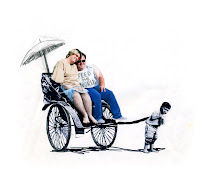i wish that i had known in that first minute we met the unpayable debt that i owed you
the opening line to 'kettering', the opening track to the antler's stunning, beautiful, terrifyingly sad album, 'hospice.' it brings up an interesting way to look at human relations. there are countless, little, seemingly inane things we do for one another - that mostly go unnoticed. the little bits of charity, of empathy. and i won't go so far as to include pity. pity is empathy without the compassion; it's more an expression of superiority than anything else; it's inherently absorbed with one's own situation: the attempt to reach out and understand another is blocked by smug satisfaction.
but i think that this line is an excellent example of what is right in music and art today - and, 'course, human beings. at it's best, art bowls us over, knocks our pins down, shifts paradigms.
what is the effect of this line, so painfully conscious of the debits and credits we accrue with one another, unknowingly? how does life change? how can life change? with this acknowledgment of a tremendous debt owed that is incapable of payment? it could make us more conscientious? or it could make us too obsessive over debts and credits, over equal treatment. it seems dangerous to lean too far past conscientiousness..
because of course these debts between us are unpayable. there is no currency or method for measuring the effect we have on one another. we can't put our best scientists on it in hopes of putting a firm number on what is mindfulness, what is empathy returned?
and in fact i think the problem is that we are not inclined to sully the discussion with thoughts of repayment. or maybe we shouldn't be. does it stop being empathy if we're chalking up our compassion, ranking it, balancing it? it seems like it does. there's far too much 'self' involved in this ranking, balancing, thinking about what i have received, for a true connection to the Other's problems to survive.
with all this said, it is clear this is yet another aspect of the idealism vs. pragmatism debate. are we basing our actions upon a primary view to our conception of what the world is, or how it should be? how much do we expect back from people? do we act with our future, continued action contingent upon reciprocation? because certainly much of life is adaptation to reality.
it all comes back to the fundamental question and tension of human existence:
what should be changed?
what should be accepted?

No comments:
Post a Comment